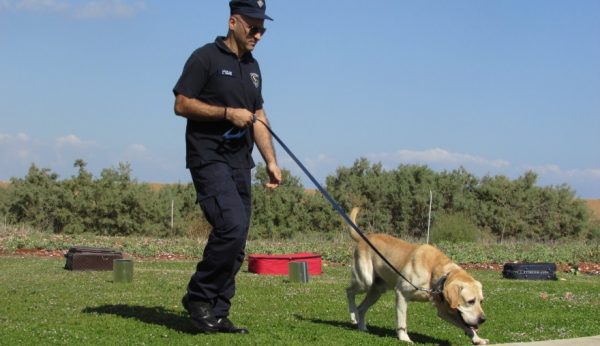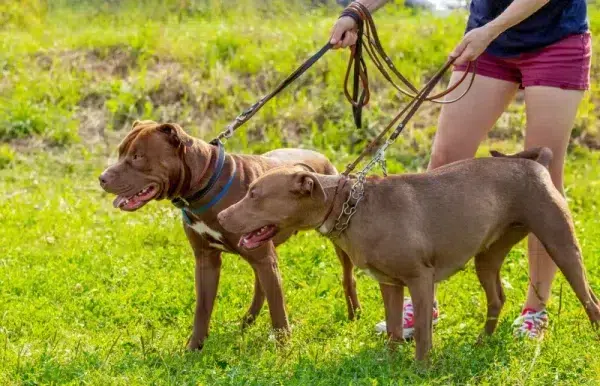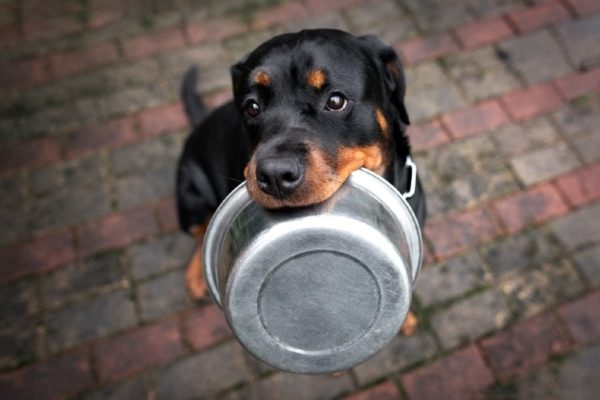In this article
Here is everything you need to know about your unvaccinated puppy, including vaccine schedules, diseases to be aware of, and how to best keep them safe before they have all of their vaccines.

Can an Unvaccinated Puppy Be Around Vaccinated Dogs?
Yes. It is typically considered safe for an unvaccinated puppy to interact with vaccinated dogs that aren’t sick. That means you can introduce your puppy to other dogs in your home right away if the other dogs are fully vaccinated. You can also introduce them to your friends’ dogs if they are fully vaccinated. The other dogs’ vaccines should help protect your puppy from getting sick. But just because you can introduce your puppy to vaccinated dogs before they are fully vaccinated doesn’t mean that you necessarily should.
Socialization and training are important pillars of puppy development, making you want to start introducing them and bringing them out as soon as possible. However, you have to be safe and smart about how you do this in order to protect your puppy. If you don’t need to bring your puppy out and about or around other dogs, you shouldn’t. If you want to start socializing your dog from a young age, you can bring them around vaccinated dogs, but make sure that you do so in a safe and controlled environment.
You should never bring your unvaccinated puppy around any dogs that are showing signs of illness. If one of your dogs in your home is sick, you should quarantine them from the puppy to prevent your young dog from getting sick.
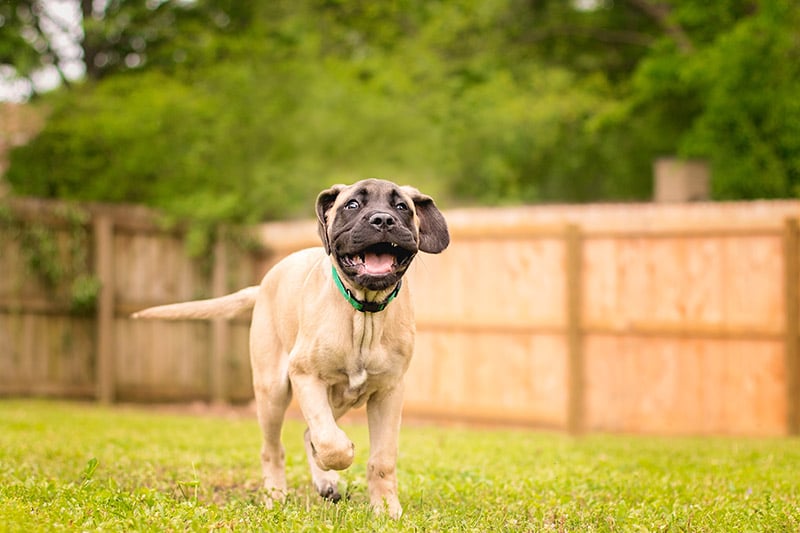
Safe Environments vs. Unsafe Environments
While vaccinated dogs should be safe for your puppy to interact with, not all environments where dogs interact are safe. Safe environments include places that you control. Your house, your yard, or your friend’s house are examples of this. These places do not contain strange or unfamiliar dogs, and you are in charge of the cleanliness of the areas. Safe environments are ones in which unvaccinated dogs are not present and have not been around.
Unsafe environments include places like the dog park, the local sidewalk, parks, beaches, and restaurant patios. These places do not screen for vaccination status, and therefore, without your knowledge, there could be an unvaccinated dog nearby. Even if a place like a dog park is empty, there could have been an unvaccinated or sick dog in the area recently enough to make your dog sick. These uncontrolled environments should be avoided even if you are trying to meet up with dogs that you know are fully vaccinated.
Some facilities, like boarding facilities and daycares, can be considered safe or unsafe depending on their policies. Many times, these types of facilities require dogs to be vaccinated to enter, but they might not screen as well as you would like. However, in most cases, your dog will not be able to enter these types of areas without being vaccinated themselves.
- Your home
- Your yard
- A responsible friend’s home
- Veterinarian’s office (with caution)
- Public dog park
- Local sidewalk
- Dog beaches
- Restaurant patios
When Are Puppies Considered to Be Fully Vaccinated?
Puppies get a series of vaccines starting at 6-8 weeks of age and ending at 16- 20 weeks of age. They will then receive a booster about 1 year later and then every 1-3 years continuing. Your puppy is considered fully protected about two weeks following that last vaccination. So, puppies that complete their series at 18 weeks old, are fully protected at 20 weeks and so on.
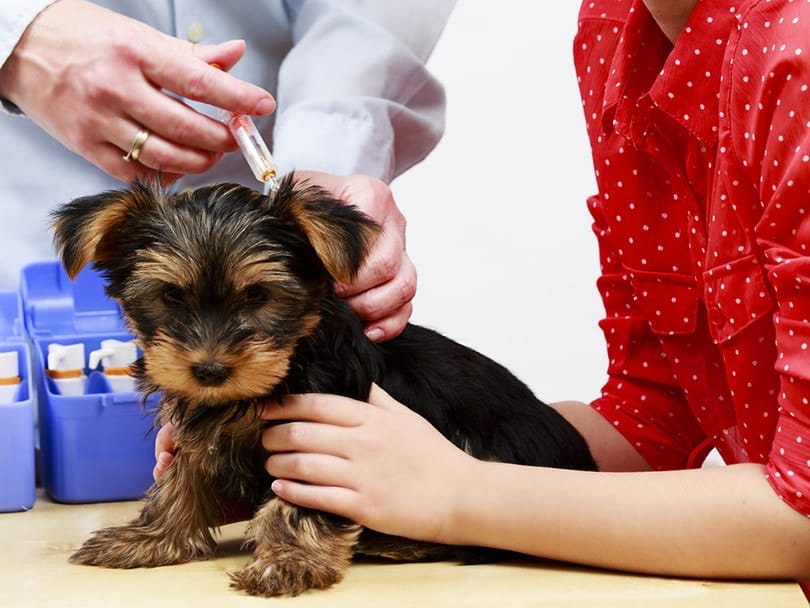
Puppy Vaccine Schedule
| Age | Recommended Vaccinations | Optional Vaccinations |
| 6–8 weeks | DHPP (vaccines for distemper, adenovirus [hepatitis], parainfluenza, and parvovirus) | Bordetella |
| 10–12 weeks | DHPP | Leptospirosis, Bordetella, Lyme disease, influenza |
| 16–18 weeks | DHPP, rabies | Leptospirosis, Bordetella, Lyme disease, influenza |
Which Diseases Are Dangerous to Puppies?
There are a number of canine diseases that are particularly dangerous to puppies. Their immune systems are not fully developed, and without vaccinations, they aren’t as protected against some truly nasty bugs. Some of the most dangerous diseases to puppies include things like parvo, distemper, and hepatitis which can be potentially fatal. Vaccines help protect puppies against most of these threats, but without up-to-date vaccines, your dog could be at risk.

When in Doubt, Err on the Side of Caution
If you are unsure about letting your puppy interact with unvaccinated or unfamiliar dogs, you should simply stay home. There are a variety of diseases carried by dogs, both vaccinated and unvaccinated, that can affect your puppy. These types of illnesses can affect a young puppy whose immune system is still developing.
It can also be stressful to bring your puppy into unsafe environments, like the dog park, because you don’t know if every other dog is vaccinated. If you are worried, simply wait until your puppy is fully vaccinated before bringing them around other dogs, even vaccinated dogs. It never hurts to be more cautious. As discussed, most puppies will be fully vaccinated by 16-20 weeks of age, which is not too long to wait to protect your puppy, especially if you’re worried about it.

Conclusion
It can be stressful to bring a young puppy outside, especially if there are other unfamiliar dogs around. Puppies are not fully vaccinated for a few months, and without vaccine protection, they can pick up serious and potentially dangerous diseases. Puppies are susceptible to many diseases that can cause severe health problems and even death. While it is safe for your puppy to interact with fully vaccinated dogs in a safe environment, sometimes it is a better idea to just keep your dog at home until they receive all of their important vaccines.
See also:
- 16 Most Playful Dog Breeds: Facts & History (With Pictures)
- How to Stop a Dog from Marking in the House in 5 Simple Steps
Featured Image Credit: iStock / Getty Images/ kali9


